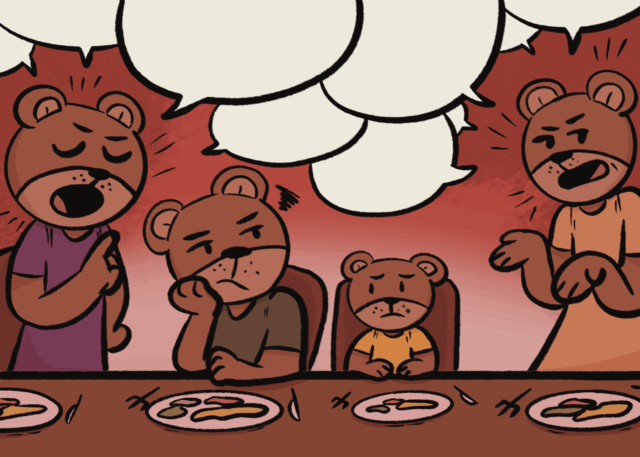By The Editorial Board
It’s Thanksgiving and the TV has been blaring between football and parades the entire day. Meanwhile, your siblings have been blasting TikTok all day and you haven’t eaten in eight hours. Finally, the moment arrives. “Dinner’s ready!” your parents yell as you drag your feet to the table.
In a world that’s more politically charged than ever, sometimes holiday dinner tables can feel more like war zones and conversations turn into cross-examinations. Between outdated political beliefs and an influx of propaganda, it frequently feels like the weight of changing our parents’ beliefs falls on us, making holidays seem more like interventions.
A 2024 poll by The American Psychological Association showed that two in five adults “said they were stressed by the thought of politics coming up at holiday gatherings.”
Whether it’s politics, religion or money, chances are there is probably something within those topics that we all fear will arise during our parents’ conversations over Thanksgiving dinner. However, it’s important to realize that arguing with our parents to change their beliefs is rarely productive. We can yell, fight and stat-vomit all we want, but the truth is that facts often aren’t what change people’s minds.
Mel Robbins, a No. 1 New York Times bestselling author who has amassed an online following of over 40 million people, coined the term “let them” in her 2024 book “The Let Them Theory.” The book emphasizes the importance of minimizing expectations for those around you and instead focusing on what you can control.
“Acceptance of another person, as they are, is the foundation of a healthy and loving relationship,” Robbins said in her book. “When someone feels that you accept them as they are, they feel safe with you. The opposite happens when you pressure, change, criticize, push or expect someone to behave differently than they are. This pressure puts you and your loved one in a battle for control.”
And don’t get us wrong — there are many instances where it’s essential to speak up, have a voice and be loud about your thoughts, but holidays are probably not one of them. Ultimately, choosing silence isn’t suppression; it’s self-respect.
An article from The New Yorker utilized cognitive science to explain the psychology behind our beliefs. As humans, we automatically justify our beliefs through “motivated reasoning” or “cognitive bias,” making it harder to see the facts objectively. We are also naturally inclined to judge and analyze the faults in other people’s beliefs before our own.
While it’s logical to think that providing facts would influence people’s opinions, the truth is that in most instances, humans would rather justify their own beliefs, even if statistics prove them wrong.
It can be easy to want to argue your way into changing your parents’ beliefs, but at the end of the day, life is finite. Spend your holidays expressing gratitude, and if someone wants to share their opinion on something you disagree with, let them.
While this is not an excuse for lackluster beliefs, it is a reminder that draining your own mental energy attempting to change your parents’ ideology is only causing more damage to your relationship.
We reclaim our power by letting go of the feeling that we have to control or change our parents’ beliefs, actions or opinions. While heated topics like politics, religion and money can quickly become gasoline-fueled fires during holiday dinners, our power comes from intentional silence.
Our parents and grandparents grew up in a much different era than we did, with vastly different ideas, virtues and beliefs. And while a majority of these concepts might seem outdated or incorrect to us now, it’s what seemed right to them during their early adulthood.
And just like us, I’m sure our parents, too, felt the impending doom of holiday dinner conversational differences. However, the reality is that the chances of adopting a new worldview at age 50 or 60 are low, and expecting our parents to do so is draining.
Our parents don’t know everything; they are imperfect, just like us, and while we often fall into the trap of placing unrealistic expectations on them, we must remember this is their first time being human, too.
“Let Them,” Robbins said in her book. “Let your parents be less than what you deserve. Let your family life be something that isn’t a fairy tale. They are doing the best they can with the resources and life experiences they have. Now you get to choose what happens moving forward.”
Remove the expectation that you are obligated to change your parents’ beliefs. Enjoy your family time, which becomes increasingly limited as we grow up. You’re your own person, and while we all owe something to our parents, their validation isn’t necessary to be happy. Love your parents, regardless of your differences. And whatever happens at the Thanksgiving dinner table, let it.



